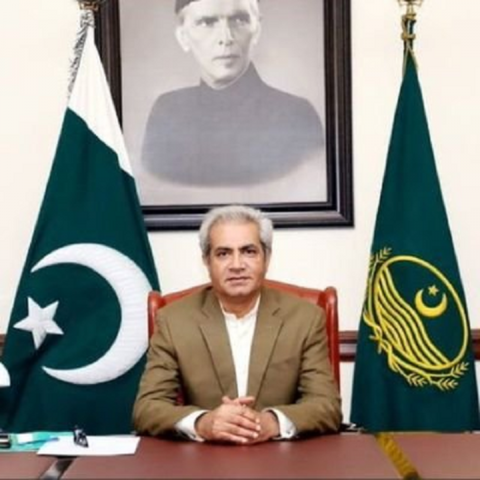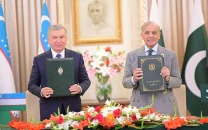Federal govt sacks Punjab governor
Cabinet Division issues notification after Alvi ‘strongly rejects’ PM’s advice

The federal government issued a notification for the removal of Punjab Governor Omer Sarfraz Cheema as the constitutional period of sending the summary to the president to this effect ended, according to the notice of the Cabinet Division available with The Express Tribune on Tuesday.
The notification came as President Arif Alvi “strongly rejected” Prime Minister Shehbaz Sharif’s advice to remove Cheema, saying that under Clause 3 of Article 101 of the Constitution, “the Governor shall hold office during the pleasure of the President”.
The federal government had sent a summary for the removal of Governor Cheema to the president on April 17. As per the Constitution, the summary would take effect automatically without any decision from the president after the stipulated time period.
After the completion of the constitutional period of the summary, the Cabinet Division issued the notification. According to the notification, Omar Cheema’s term as governor expires on Tuesday (today). Sources said that Cheema would not be allowed to enter the Governor House.
“In terms of Article 101 and Proviso to Article 48 (1) of the Constitution of the Islamic Republic of Pakistan, read with serial No 2D of Schedule V-B to the Rules of Business, 1973 and the Prime Minister's advice(s) rendered on 17-04-2022 and 01-05-2022 for removal of governor of Punjab, Omer Sarfraz Cheema ceases to hold the office of the Punjab governor, with immediate effect,” according to the Cabinet Division notification.
“The speaker of the Provincial Assembly of the Punjab shall perform the functions of Punjab governor as acting governor till the appointment of a new governor, in accordance with Article 104 of the Constitution,” it added.
Until the appointment of the new governor, Punjab Assembly Speaker Chaudhry Pervaiz Elahi would serve as the acting governor.
Earlier on Monday, President Alvi “strongly rejected” PM Shehbaz’s advice to remove Governor Cheema on the grounds that the governor could not be removed without his approval, a decision.
According to an official statement, President Alvi had conveyed to the premier that the Punjab governor could not be removed without his approval.
Alvi wrote that the governor “cannot be removed” because there was neither any allegation of misconduct nor conviction by any court of law or of any act committed by him contrary to the Constitution.
He stated that it was his duty as the head of the state to represent the unity of “the Islamic Republic of Pakistan in terms of Article 41 of the Constitution”.
Alvi highlighted the constitutional role of the Punjab governor, saying that Cheema had sent a report earlier regarding the unfortunate happenings in the Punjab Assembly, questions regarding the validity of the resignation of Usman Buzdar as the chief minister and shifting of loyalties.
Also read: 'Leave your office peacefully', interior minister warns Punjab governor
Rejecting the advice of the prime minister, Alvi stated that he was convinced that the removal of the governor would be unfair and against the norms of justice.
He emphasised that it was essential that the incumbent governor should continue to stay to encourage and promote a healthy and clean democratic system, where members were not coerced or bought to bring about an illegitimate change and Article 63-A of the Constitution specifically discouraged such activities.
The president highlighted that “he was committed to stand by the provisions of the Constitution of Pakistan in these difficult times and strongly rejected the advice of the prime minister to remove the Punjab governor”.
Some legal and political experts saw the president’s move of not accepting the prime minister’s summary for the removal of Cheema as a deliberate attempt to create a constitutional crisis as the president was bound to act in accordance with the advice of the cabinet and the prime minister.
However, former information minister and senior Pakistan Tehreek-e-Insaf (PTI) leader Fawad Chaudhry supported Alvi’s decision, saying it was a “100 per cent” correct and constitutional decision which should be respected.
Supreme Court Bar Association (SCBA) President Ahsan Bhoon said that the president’s decision was a violation of the Constitution. “Article 48(1) [President to act on advice, etc] is absolutely clear that the prime minister’s advice is binding on the president and he can’t act otherwise,” he said.
Terming the president’s decision a “deliberate violation of the Constitution”, Bhoon stressed that rejecting the advice of the prime minister was “a deliberate attempt to create a constitutional crisis” and the matter would now end up in the courts.
“Pakistan has a parliamentary structure and not a presidential system. The general scheme of the Constitution says that it’s binding on the president to act upon the PM’s advice,” Ahmed Bilal Mehboob of the Pakistan Institute of Legislative Development and Transparency (PILDAT) opined.
The PILDAT chief told The Express Tribune that a wrong precedent was set and if the practice continued, it would create another power centre in the country and shake the foundation of the parliamentary structure.
In the parliamentary system, Mehboob said, the prime minister and the cabinet did all the work and the president acted as a symbolic head of state. “In this way, the president can even reject the summary for the appointment or removal of an army chief,” Mehboob added.
Mehboob said that PTI Chairman Imran Khan and his party had also frequently maintained that they would not let the incumbent government work smoothly and do whatever they could to destabilise the Shehbaz Sharif-led dispensation.
Mehboob took strong exception to the language used in the official statement – “rejecting PM’s summary”. He said that the president could have conveyed the message in a polite manner instead of using words like “strongly rejected” because there was no need for using such a language in official communication.
Fawad said that the governor’s office was a constitutional office. Even a peon or a clerk cannot be removed the way the government was removing the governor, he said. “The president has not committed any violation,” Fawad said, adding it was the right decision even if “we were in power and the president had taken such a decision”.
Constitutionally, Fawad said: “The prime minister and the cabinet’s advice is binding upon the president for the appointment of a person but not for the removal.” He added that the matter might end up before the courts for further interpretation.



















COMMENTS
Comments are moderated and generally will be posted if they are on-topic and not abusive.
For more information, please see our Comments FAQ